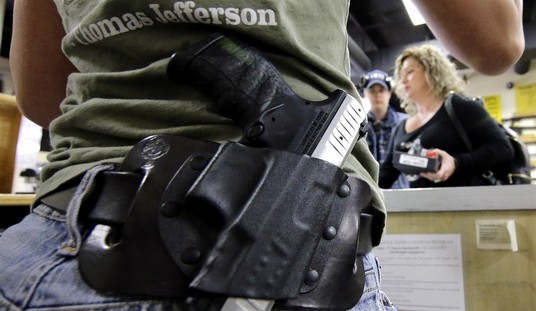The Second Amendment isn't an overly complex piece of law. In fact, considering what comes out of Congress or every single state legislature, it's remarkably straightforward. "A well regulated militia being necessary to the security of a free state, the people's right to keep and bear arms shall not be infringed."
And yet, despite being pretty straightforward, we've had generations of argument, debate, restriction, and court battles over such a simple piece of text.
Part of the issue is that some people like to ignore it while others like to read in whatever it is they want to read into it.
Then we have people like an op-ed writer who seems to think that we need to pay attention to the words, but only some of them.
We are long overdue to use more precise language about our national obsession with guns, and our repugnant aversion to gun safety legislation. The biggest problem is the willingness by politicians and news outlets to echo the term ‘Second Amendment’ when it is babbled by gun extremists.
...
The National Rifle Association likes the part after the comma very much. That was convenient when the NRA drifted from being a gun training and sportsman advocacy group into being flacks for gun manufacturers. The Brennan Center for Justice notes, “Today at the NRA’s headquarters in Fairfax, Virginia, oversized letters on the facade no longer refer to ‘marksmanship’ and ‘safety.’ Instead, the Second Amendment is emblazoned on a wall of the building’s lobby. Visitors might not notice that the text is incomplete. It reads: ‘.. the right of the people to keep and bear arms, shall not be infringed.’ The first half—the part about the well regulated militia—has been edited out.”
For more than two centuries we largely understood that the Second Amendment was to be understood in its entirety. The opening clause was relevant and important. The clause set up the rationale for the rest of it. Laws that did not impose upon a well-regulated militia, such as the National Guard, presumptively did not run afoul of the amendment.
That changed a bit in 2008 with the Supreme Court case District of Columbia v. Heller. The Court, responding to laws leading to a near-total ban on handguns in the District of Columbia, carved out a new course for an individual right to own handguns not dependent on the militia clause.
First, let's look at the argument that the Second Amendment was largely a collected right for just a moment. This is a common enough claim that much of the work for debunking it has already been done.
Second Amendment attorney Kostas Moros has a lengthy thread on X, formerly Twitter, illustrating just how wrong that is. Here's the first of the thread:
This thread covers 19th century views on the Second Amendment. It's a revised version of a prior thread, with the biggest change being the links to most of the sources, as well as some corrected typos.
— Kostas Moros (@MorosKostas) April 10, 2023
This first excerpt is from William Rawle.https://t.co/Zyy0zgajy9 pic.twitter.com/FIpWcfbQJ9
There's a lot there, so take your time.
Yet even beyond that, there's another aspect of this that has to be considered, and that's how the claim just doesn't make sense.
The author brings up the National Guard as an example of the kind of militia the Second Amendment was meant to protect, but the National Guard is a governmental agency. Why would the government need to preserve the right of the government to have guns? It's absolutely insane to think that, and yet there it is, plain as day.
But the entire premise of his op-ed is that words matter. The problem is how he's ignoring words.
Oh, he takes issue with "shall not be infringed," but the truth of the matter is that the phrase is very clear. He brushes it off, though, because it's not about you and me in his mind, but the state.
Why, then, does the Second Amendment say "the people's right" rather than "the states' right" or something similar?
In literally every other part of the Constitution and the Bill of Rights, the phrase "the people" is held to mean an individual right. In fact, the phrase shows up in the First, Second, Fourth, and Tenth Amendments, and in the first, third, and last of those, it's not even a matter for discussion as to whether the phrase means the people or the states.
Especially as the Tenth Amendment differentiated the two by naming each. Since the Bill of Rights was all pretty much decided at the same time, it would seem that our Founding Fathers might have noticed the use of language varying so much.
See, what the author doesn't get is that folks on this side of the debate recognize that opening clause quite well. We simply understand what it means and that nothing in there was intended to suggest the ability to limit our rights, especially since the last four words of the amendment are pretty damn clear about that.
Instead, it was intended for the people of this nation to have the means to defend her shores from foreign invasion or to defend their liberties from a domestic incursion. And again, "the people" are people, not states.
You'd think that people would understand that a nation born out of struggle against a powerful state they believed had grown too tyrannical wouldn't seek to empower only the state to have the means of force, ignoring the individuals who united to throw off the yolk of a monarchy, yet here we are.








Join the conversation as a VIP Member